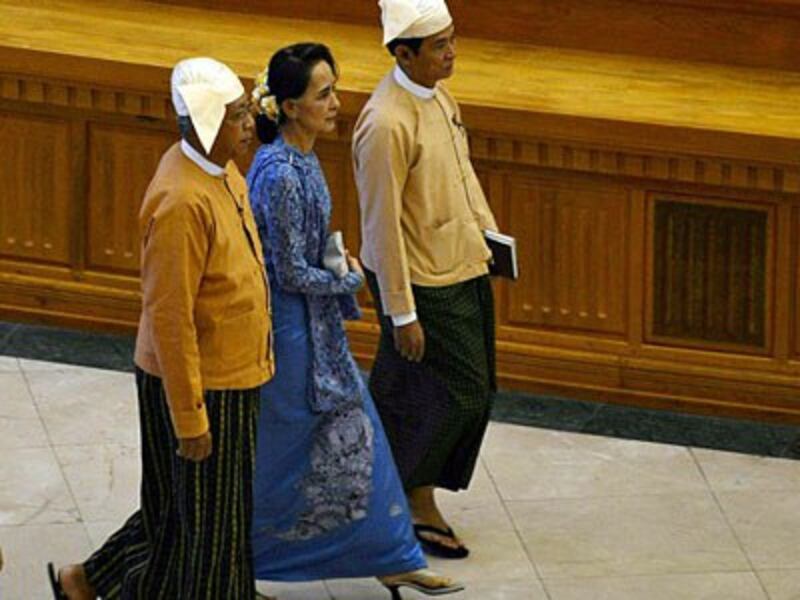Myanmar’s parliament on Friday elected a former political prisoner and lower house speaker from the ruling party as one of three vice presidents, pivoting him into a position to become the second president of the country's nearly two-year-old civilian government.
Win Myint, a trusted member of Myanmar’s de facto leader Aung San Suu Kyi’s inner circle and a member of the National League for Democracy’s (NLD) central executive committee, won 273 of lawmakers' 304 votes.
Win Myint, who represents Yangon region’s Tamwe township in parliament, has been tipped to replace former President Htin Kyaw, 71, who stepped down from the largely ceremonial position on Wednesday to “take a rest” from politics. Vice President Myint Swe is serving as acting president until parliament chooses a replacement.
Lower house lawmakers also nominated Thaung Aye, an opposition, pro-military Union Solidarity and Development Party (USDP) legislator as a vice presidential candidate, but he received only 27 votes.
The vote did not include military members of parliament, who are appointed to their seats, because only elected lawmakers can vote on appointments.
Next week parliament will elect a new president from among Myanmar’s three vice presidents — Win Myint, Myint Swe, and Henry Van Thio.
Many of Win Myint’s fellow lawmakers voiced support for him.
“We would welcome it if the president has full power and Win Myint stands by the people [if elected president],” said Thaung Aye, the USDP candidate for vice president, who represents Pyawbye township in central Myanmar’s Mandalay region.
Former political prisoner and current lawmaker Khin San Hlaing, who represents Pale township in northwestern Myanmar’s Sagaing region, contemplated what the extent of Win Myint’s power as president would be.
“We have to wait and see how much authority he can have as a president,” she said. “Because Win Myint is a politician, he can control the country’s politics very well.”
Khin Saw Wai, an MP from the Arakan National Party who represents Rathedaung township in Rakhine state, said she voted for Win Myint because she expects that he will work more on behalf of ethnic Rakhine people in the undeveloped state plagued by violence and ethnic and religious divisions.
Rathedaung was one of three townships in northern Rakhine where a brutal crackdown by the Myanmar military that began last August drove nearly 700,000 Rohingya Muslims across the border to Bangladesh in what the United Nations has called a campaign of ethnic cleansing, if not genocide.
More dominant
Thein Tun, a USDP lawmaker who represents Kyaunggon township in southwestern Myanmar’s Ayeyarwady region, predicted a notable change in Myanmar’s ministries if Win Myint becomes president.
“There will be a change if Win Myint becomes president because he got to know the ministries very well, especially when he was lower house speaker,” he said. “I think some ministers who don't perform well in their jobs will be reshuffled if he becomes president.”
Some observers said the politician would become a more dominant force as president.
“U Win Myint could handle the lower house very well,” said activist and political analyst Mya Aye, the only Muslim leader of the pro-democracy 88 Generation Students Group — now known as the 88 Generation Peace and Open Society Group. “If he becomes president, he will become more dominant in politics.”
Htin Kyaw, one of Aung San Suu Kyi’s closest advisers, served as a proxy president for the Nobel laureate who is barred from the nation’s highest office by a constitutional provision prohibiting anyone with foreign relatives from becoming president.
Aung San Suu Kyi’s late husband was a British national, as are her two sons.

No ‘puppet president’
Given Aung San Suu Kyi’s power as de facto national leader as Myanmar’s state counselor — a position she once described as “above the president”— others doubted whether a Win Myint presidency would bring any real change.
Saw Than Myint, chairman of the Federal Union Party, said he does not want Win Myint to be a “puppet president.”
“If he is, there will not be any change, though the presidential position has changed,” he said. “I hope he can work as the president as much as he can and as much as the constitution allows.”
Sai Nyunt Lwin, general secretary of the Shan Nationalities League for Democracy, said: “A president has his own authority, but the new president will be the same as the previous one if the NLD controls him with its policies and attitudes. It seems as though there were some restrictions by the NLD on the previous president.”
Aung Thein, a lawyer and Muslim community leader from Meiktila in Mandalay region, said he believes that whoever becomes the new president will have greater power.
“Daw [honorific] Aung San Suu Kyi will transfer some of her duties,” he said. “Win Myint will work effectively on corruption, the judicial system, and the rule of law.”
Meiktila was the scene of violent riots between Buddhists and Muslims in early 2013 that led to the displacement of thousands of people — mainly Muslims — who were forced indefinitely into camps.
Win Myint, 66, was born in in Nyaung Chaung village in Ayeyarwady region’s Danubyu township. He was educated as a lawyer and served as an advocate in Myanmar’s High Court.
He was briefly imprisoned by the military junta during the 1988 pro-democracy uprising, but went on to win a parliamentary seat in the 1990 elections, though the results were nullified by the military regime.
Win Myint won a seat in by-elections in 2012 and was appointed speaker of the lower house after the NLD won a landslide victory in general elections in November 2015.
Reported by Win Ko Ko Latt and Wai Mar Tun for RFA’s Myanmar Service. Translated by Khet Mar. Written in English by Roseanne Gerin.
